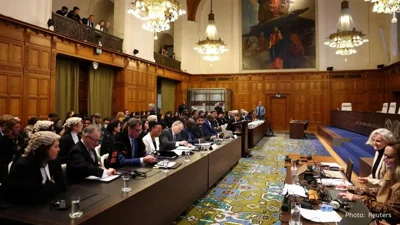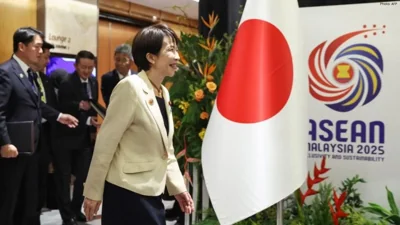
Post by : Anees Nasser
Historically, the wellness programs in businesses focused on physical aspects like gym memberships and mental health resources. However, one crucial factor often overlooked is:
Financial anxiety.
Concerns such as missed EMIs, high-interest loans, unexpected medical costs for family, increasing rents, education expenses, feelings of guilt about saving, and uncertainties about the future seep into workplaces.
This ever-present financial stress is not a mere personal issue; it fundamentally impacts overall health.
Leading companies are coming to realize:
The link between mental well-being and financial stability is undeniable.
Today's economy pushes employees towards unprecedented challenges:
volatile market conditions
escalating living expenses
increasing healthcare costs
student loan burdens
cultural expectations around finances
erratic career paths
the lure of digital spending
pressures from social comparisons
Even those in high-income brackets experience stress—not from insufficient income, but due to the lack of comprehensive financial education.
Employees do not falter because they are unwise; they struggle because financial management isn’t prioritized in learning.
Financial worries subtly affect:
productivity levels
sleep quality
overall health
decision-making abilities
creativity and focus
attendance rates
job satisfaction levels
employee loyalty and retention
A fatigued mind is not equipped for innovation.
An anxious workforce struggles with collaboration.
Financial worries create an environment where growth becomes elusive.
Organizations are beginning to recognize:
Burnout might not only stem from overloaded schedules; it could arise from ongoing financial fears.
Previously, discussions around finances in workplaces were confined to:
salary discussions
annual performance reviews
bonus announcements
tax-related discussions
However, the focus is expanding.
Innovative employers are now offering:
financial wellness evaluations
emergency fund assistance
systems that connect payroll to savings
workshops on budgeting
debt management assistance
guidance on retirement and smart investing
in-house financial advisers
integrated mental and financial health programs
real-time access to salaries
educational sessions on gratuity and insurance
Well-being has evolved; it now encompasses financial capability alongside physical and mental health.
Employees in India navigate a complex financial environment:
providing for extended family
high expectations for cultural events and education
an obsession with real estate
soaring rents in urban areas
social pressures to display success
family obligations, even in nuclear setups
responsibility for medical emergencies amidst limited healthcare access
In India, financial strain is intertwined with love, expectations, ambition, and cultural values.
This creates a unique emotional-financial challenge that businesses cannot overlook.
Financial health isn't solely about managing funds; it involves building a healthy financial perspective.
Employees hold beliefs such as:
“I should be earning more by now.”
“I’m not keeping up.”
“Everyone around me is achieving more.”
“Investments baffle me, and I hesitate to seek advice.”
“I find it hard to refuse family-related expenses.”
“Saving means sacrificing my enjoyment.”
Organizations are fostering emotional literacy around finances through:
non-judgmental conversations about money
workshops on guilt and boundary creation
insights from financial psychology
coaching on spending patterns
money planning tailored to life stages
It's more about therapeutic approaches than mere number crunching.
Younger generations are pressuring corporations to redefine what financial security entails.
Their priorities include:
salary transparency
financial respect
flexible access to pay
support for side hustles
basic education on retirement
promoting anti-debt attitudes
empowering women financially
encouraging a healthy relationship with money
They don't subscribe to a “work until retirement” mindset.
Instead, they embrace the idea of working smart, living presently, and planning wisely.
They expect their workplaces to align with these values.
Technology is transforming paycheck psychology.
Fintech solutions tailored for employees are providing:
automatic savings deductions
AI-powered budgeting tools
goal-oriented saving dashboards
small, daily investing nudges
income-linked investment methods
immediate access to earnings
funds dedicated to emergencies
bite-size investment courses
coaching tracks focused on women and finance
Finance no longer feels intimidating.
It’s shifted toward nudges, visuals, and simple, digestible steps.
The role of HR is expanding beyond recruitment and compliance.
HR departments are now involved in:
strategies for financial and mental wellness
designing compensation packages that alleviate stress
interventions during salary cycles
referrals to empathetic financial counselling
strategic planning of hybrid benefits
initiatives aimed at enhancing financial literacy
During performance evaluations, financial stress discussions are being integrated—not for scrutiny, but to foster support.
The terminology is shifting from “expense” to employee well-being and sustainability.
Indicators that suggest financial stress include:
working overtime despite fatigue
hesitance to use leave
visible anxiousness during paydays
unexpected requests for loans
physical presence without mental engagement
withdrawal from team activities
selling assets prematurely
displaying panic during financial downturns
Attentive leaders are learning to recognize these signs to offer the necessary support.
Today's organizations are crafting wellness strategies that include:
mental health
financial health
physical health
Comprehensive initiatives now include:
weeks focusing on mindfulness and financial planning
webinars addressing stress and finance
programs intertwining sleep and savings
cooking workshops optimizing nutrition and budgets
resilience training that incorporates financial boundaries
True wellness is being regarded as an ongoing system rather than a one-off event.
A fundamental principle in the mindful money movement is:
No shame.
No intrusion into spending choices.
No imposition of decisions.
Employers are providing resources while allowing employees to maintain control over their choices.
This exemplifies empowerment rather than a controlling framework.
Recognizing dignity is essential in promoting well-being.
Future employee orientation will include:
standard HR documents
team introductions
access to required software
Along with:
basic financial principles
initial retirement resources
clarification on insurance matters
tax guidance
inducing habits of saving
goal-setting templates
assistance with emergency funds
New recruits won't just acquire equipment; they will gain foundational life skills.
Effective nudges in the workplace may encompass:
Monday reminders for systematic investing
reflections on expenses during Friday breaks
automated investments aligned with income receipt
short lunchtime financial discussions
guiding breaks from “pay yourself first” obligations
Small actions transcend radical overhauls.
Consistency triumphs over perfection.
Financial well-being is poised to endure due to factors like:
the continued rise in debt
high costs associated with medical emergencies
lingering inflation
unpredictable work environments
deep emotional scars surrounding money
employee demand for purposeful careers coupled with security
organizations’ need for stability and creativity
Finance is no longer a taboo topic; it’s a crucial aspect of wellness.
Work environments that advocate for financial wellness cultivate more than talent; they nurture resilient individuals.
Employees are not satisfied with mere salaries.
They seek:
stability
clarity
capability
freedom
an end to hidden anxieties
When workers feel financially balanced, organizations benefit from:
enhanced focus
reduced turnover
increased morale
better mental health
strong collaboration
true allegiance
Productivity emerges from tranquility, not pressure.
The future of the workplace is not merely about mindful meetings but centers around mindful financial practices.
This piece examines trends in workplace wellness and financial behavior. It does not serve as financial or medical advice. Individuals should consult professionals for personalized financial and emotional guidance.










Prashant Tamang, Indian Idol 3 winner, Dies in Sleep
The passing of Prashant Tamang, a cherished singer, has saddened fans worldwide as tributes pour in

Top Ranked Aryna Sabalenka Faces Australian Open 2026 Without a Title to Defend
Aryna Sabalenka enters the Australian Open 2026 with pressure as the top seed, yet without a defendi

Merz Predicts EU-India Trade Agreement Finalization Soon
German Chancellor Merz hints at a potential EU-India free trade agreement signing by month's end, fo

Japan's Security Aid to Southeast Asia Hits $147 Million
Japan's OSA budget surges to $147M, enhancing military ties with ASEAN nations to fortify security a

Eruption of Mount Semeru: Ash Rises to 2 km, Pyroclastic Flow Reaches 5 km
Mount Semeru erupted at 10:25 p.m. local time, producing a 5 km pyroclastic flow with ash rising 2 k

Tragic Bushfires Ravage Victoria: One Confirmed Dead, Over 300 Properties Destroyed
Victoria faces severe bushfires leading to one fatality and extensive property loss, as emergency se